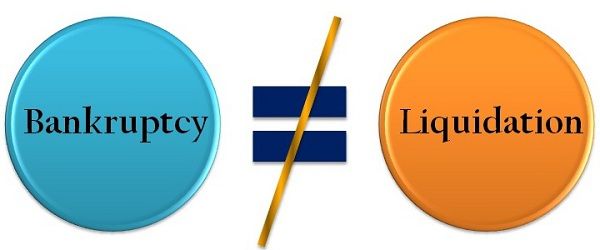 Bankruptcy can be understood as a financial state, whereby a person is declared insolvent by the court, resulting in legal orders directed to resolve insolvency, i.e. to dispose of personal assets to discharge obligations. On the other hand, liquidation may be defined as the process of winding up of company’s affairs by disposing-off assets, in order to discharge liabilities of the debenture holders creditors, employees and other parties.
Bankruptcy can be understood as a financial state, whereby a person is declared insolvent by the court, resulting in legal orders directed to resolve insolvency, i.e. to dispose of personal assets to discharge obligations. On the other hand, liquidation may be defined as the process of winding up of company’s affairs by disposing-off assets, in order to discharge liabilities of the debenture holders creditors, employees and other parties.
While bankruptcy nothing but a legal scheme, wherein the person who is insolvent/bankrupt seeks relief, whereas liquidation is a procedure of final closure of the entity;’s business. Before you understand reconstruction of a firm, one has to know the fundamental differences between bankruptcy and liquidation.
Content: Bankruptcy Vs Liquidation
Comparison Chart
| Basis for Comparison | Bankruptcy | Liquidation |
|---|---|---|
| Meaning | Bankruptcy is a state, where a person or entity is not able to pay off his debts further. | Liquidation is a process in which a company is finally wound up. |
| Mode | Voluntary or Involuntary | Compulsory or Voluntary |
| Coverage | Persons and companies | Companies only |
| Reason | Insolvency | Financial instability or any other reason |
Definition of Bankruptcy
Bankruptcy is a situation in which an individual or entity becomes Bankrupt. The person or company is not able to repay the outstanding debts owed by him. It is the last stage of insolvency, and a petition is filed in the court by the debtor or by any creditor. In this procedure, the personal property of the insolvent is discharged by the court by authorizing a person commonly known as official assignee. The official assignee distributes the amount received from the private property among the various creditors on the basis of their interest.
After the discharge of secured and unsecured debts of the person adjudicated as bankrupt, then he is given a fresh start by the court.
Definition of Liquidation
The process in which the legal status of the company is completely terminated is known as liquidation. The liquidation is also known as winding up of the company. The shareholders or creditors often lead it and a petition is filed in the court for winding up the organization.
In this process, the assets of the company are sold out to pay off the claims and the accounts are settled finally. For such purposes, a liquidator is appointed by the court for dissolving the firm. The residual amount left after discharging creditors are distributed among the shareholders of the entity. In this, the future operations of the company are put to an end, so it is entirely closed, and no further dealings are done in the name of the company.
Key Differences Between Bankruptcy and Liquidation
The points given below are substantial so far as the difference between bankruptcy and liquidation:
- The legal state in which a person or company becomes bankrupt is considered as Bankruptcy while the procedure in which a company’s business is finally put to an end is considered as liquidation.
- Liquidation is limited to the company only, whereas the Bankruptcy is not limited to the company, here persons can also become bankrupt.
- The bankruptcy can be done voluntarily (petition by the person or company itself) or involuntarily (petition filed by creditors), but the liquidation can be done voluntarily (petition filed by shareholders) or compulsorily (petition filed by the creditors).
- The significant difference between the two is that Bankruptcy arises out of financial crises or insolvency, but Liquidation can be due to financial instability or due to some other reason.
Similarities
- Sale out of assets and payment of liabilities.
- Order of the court.
- Can be done voluntarily.
- Debts are more than assets.
Conclusion
Bankruptcy and Liquidation both are the worst kind of situation that can ever happen. However, in Bankruptcy, a new start is given to the person declared bankrupt, but there are no chances of the new start in case of liquidation. As the liquidation is limited to companies only, it is not necessary that every company which is liquidated is bankrupt. As there are many instances where the company is financially sound, but still it is liquidated because its shareholders have so resolved.






Leave a Reply